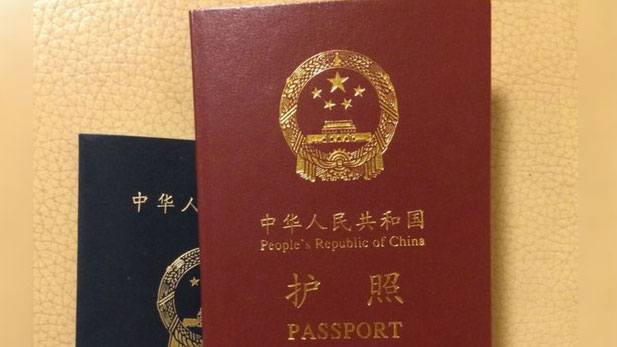Authorities in China's Qinghai province block Tibetans from travel amid Dalai Lama teachings
| Publisher | Radio Free Asia |
| Publication Date | 24 January 2018 |
| Cite as | Radio Free Asia, Authorities in China's Qinghai province block Tibetans from travel amid Dalai Lama teachings, 24 January 2018, available at: https://www.refworld.org/docid/5a942841a.html [accessed 26 May 2023] |
| Disclaimer | This is not a UNHCR publication. UNHCR is not responsible for, nor does it necessarily endorse, its content. Any views expressed are solely those of the author or publisher and do not necessarily reflect those of UNHCR, the United Nations or its Member States. |
2018-01-24
 Chinese passports are shown in a file photo. RFA
Chinese passports are shown in a file photo. RFA
Authorities in northwest China's Qinghai province are blocking Tibetans from traveling outside the country by refusing to reissue passports confiscated from members of the ethnic group who attempted to attend a politically sensitive religious gathering last year, according to Tibetan sources.
The move affected hundreds of Tibetans traveling as pilgrims to India and Nepal and as tourists to other Asian countries, and came amid official concerns over Tibetans' presence at a series of Buddhist teachings led by exiled spiritual leader the Dalai Lama in January.
"This year, again, several thousand Tibetans went to the Dalai Lama's teachings in Bodhgaya [India], but none of them were from Qinghai," said a Tibetan from the province who traveled to Bodhgaya last year in the hopes of attending another gathering known as the Kalachakra, citing contacts in India.
The Tibetan, who spoke on condition of anonymity, told RFA's Tibetan Service that he and several other pilgrims were forced to travel home from India and miss the Dalai Lama's Kalachakra ceremony in January 2017 after receiving phone calls from Chinese security personnel threatening their families with harm if they failed to return.
Chinese immigration authorities destroyed their passports – which cost 5,000 yuan (U.S. $759) each and are good for 10 years – on arrival at the airport in Sichuan province's capital Chengdu.
"They assured us that the passports would be reissued, but we went to the relevant government offices several times since then to request our passports and the authorities wouldn't give them to us," he said.
"My goal of attending the teachings in India this year went unfulfilled."
Kalachakra, which means Wheel of Time, is a ritual that prepares devotees to be reborn in Shambhala, a celestial kingdom which, it is said, will vanquish the forces of evil in a future cosmic battle.
The ceremony and teachings are often conducted outside Tibet by the Dalai Lama, who is widely reviled by Chinese leaders as a "splittist" seeking to separate Tibet, which was invaded by Communist China in 1950, from Beijing's control.
This year's month-long gathering consisted of a series of Buddhist teachings by the Dalai Lama which ended Tuesday.
Public notice
According to the source, local police stations in Qinghai had issued a public notice ahead of this months gathering that he said "banned Tibetans from listening to the Dalai Lama's teachings in any manner," and also "prohibited contact with Tibetans living outside of China."
"The local authorities also warned that sharing or storing audio and video clips of the Dalai Lama's teachings would constitute a serious offense, punishable under charges of 'separatism,' that would result in arrest and jail time," he said.
In the meantime, the source said that while some "connected individuals" may have been issued new travel documents ahead of the event, "generally speaking, ordinary Tibetans have not been granted passports."
"Thousands" of Tibetans who had traveled to Bodhgaya last year to attend the Kalachakra teachings were compelled to return after receiving warnings from Chinese authorities, he said, and "many of them had their passports cut into pieces" after arriving in Chengdu.
A second source, who also asked to remain unnamed, said that ahead of this year's gathering, many of those who made it to India are from the Ngaba (in Chinese, Aba) prefecture of historical Tibet's northeastern Amdo region, which is comprised of parts of Qinghai and Sichuan provinces.
In September, sources told RFA that Tibetans whose passports were confiscated after traveling to India last year had still not been given new ones, and "believed that they were deliberately tricked" by the authorities.
They called the refusal to reissue the passports a "discriminatory action" that they said had also been applied to members of the Muslim Uyghur ethnic group in China's northwest Xinjiang region.
Earlier this week, Tibetans traveling to Bodhgaya from Sichuan province revealed they were also told to return home immediately or face "consequences," forcing many to cut short plans to attend teachings by the Dalai Lama. Many had only recently been issued new passports and were surprised by the sudden policy change.
Reported by Kunsang Tenzin for RFA's Tibetan Service. Translated by Dorjee Damdul. Written in English by Joshua Lipes.
Link to original story on RFA website
